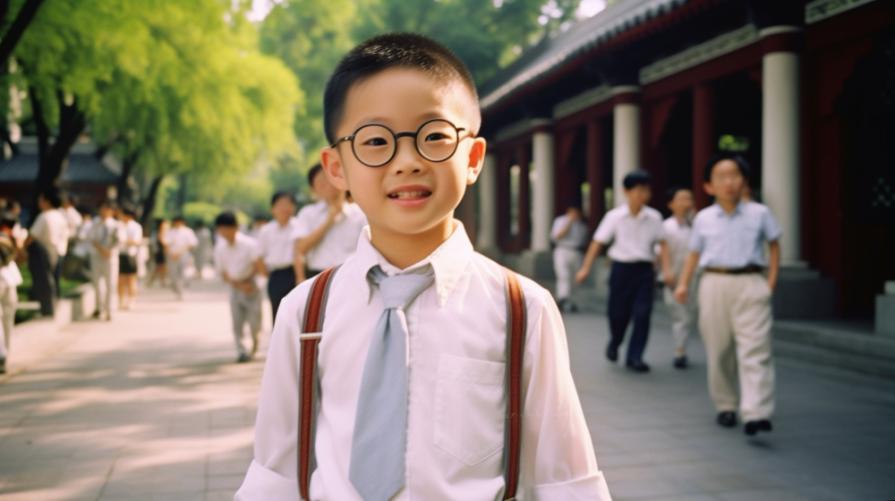In Chinese schools, everything revolves around respect for knowledge and those who pass it on. The teacher here is not just a teacher, but a person with a special status. It's not just that he is called a "respected teacher": parents and children see him as a bearer of wisdom who needs to be listened to.
Historically, this tradition dates back to the VI century, when there were state keju exams in the country. To take a good position, you had to show off not only mathematics or writing, but also knowledge of philosophy, ethics, and literature. The modern system has largely inherited this approach: a student should be developed in many directions, and not only solve problems or learn the rules of grammar.
Studying in China is based on discipline and constant repetition: children write hieroglyphs dozens of times, memorize texts, and hone their skills. In a sense, this method allows you to equalize the odds: even if the abilities are average, hard work gives results. Here they like to say: "Even an awkward bird can fly if it starts earlier." The strength of this approach is perseverance and hard work. But there is also the opposite: it takes so much time and effort that the child is almost completely immersed in studying.

12 years of study: first steps in kindergarten

The educational path in China is 12 years. But, in fact, it begins even earlier: already in kindergartens, three-year-olds begin to be introduced to hieroglyphs, simple examples, and most importantly, they are taught discipline. The structure of school education is as follows:
- primary school – 6 years, where they study Chinese, mathematics, English, music, and the basics of natural sciences;
- junior secondary school – 3 years, new subjects from the humanities and natural sciences block appear;
- Senior high school – another 3 years for those who are aiming for university.
Only the first nine years are considered mandatory, after which you can go to a vocational school, which is even more profitable for the state, because there are not enough working specialists.
Free studying, but not everywhere
The state guarantees free education only until the end of junior secondary school. Then the filter begins: to get into high school, you need to show good results and pay more. If the grades are weak, the child is sent to vocational education.
There are also private schools: they treat children more leniently, education is built individually, but the fee for this is very substantial. For most parents, this option remains inaccessible.
School as a second home

Students in China spend most of the day at school: lessons can start at half past eight in the morning, and end for high school students in the evening. Immediately after the first block of classes, there is a long lunch break. In the lower grades, at this time, they are even allowed to sleep right at the desk, while in the older grades, these hours are more often spent on additional lessons.
Physical activity is built into the daily regimen. Morning gymnastics, exercises at the stadium, sports sections and physical education lessons are all mandatory parts of the schedule. Even breaks do not always go smoothly: instead of games, schoolchildren do eye exercises or a warm-up.
Children return home not to rest, but to continue studying. Homework can take another three to four hours, and as a result, there is very little time left for entertainment and walks.
Discipline in everything
Order in the school is maintained strictly. Delays, noise, absences - all this is prohibited. 12 missed lessons without a valid reason are enough, and the student risks being kicked out of school! Even such familiar things as lunch or exercise happen strictly on schedule and under control. All this is done so that children do not waste extra time and focus on the main task - studying.
Competition from the first grades

The Chinese school is not only a discipline, but also a constant competition. Each test affects the rating, the results of some are reflected in the position of the whole class. Hence the pressure: no one wants to let their comrades down. Teachers do not hesitate to publicly reproach students for poor preparation. But not only his own future, but also the reputation of the family depends on the child's achievements! Therefore, parents try to motivate children as much as possible, and fierce competition becomes a daily reality.
Exams: Endurance Tests
Exams accompany a Chinese student all the way. Twice a year, sykao is held - a test of knowledge in the main subjects. At the end of junior high school is the zhongkao, which determines whether a student will enter high school.
But the main test remains the gaokao, great and terrible. This national exam lasts for several days and covers Chinese, mathematics, English, and elective subjects. For many, it decides everything: which university to choose, what future shines. Preparations for it have been going on for the entire past year, often for 16 hours a day. Those who have passed the gaokao well can count on prestigious universities. For families with low incomes, this is the only chance to get to the top.
Bottom line: strengths and weaknesses

The Chinese school is one of the most demanding in the world. It teaches discipline, diligence, develops memory and endurance. A child grows up in a system where knowledge and respect for work are valued, but with that comes a huge workload. Constant stress, lack of sleep, lack of free time are what millions of schoolchildren face.
In recent years, China has been trying to take steps towards an individual approach and reducing pressure, but so far the basics remain the same: strict discipline, respect for the teacher, and the belief that success is achieved through hard work.









